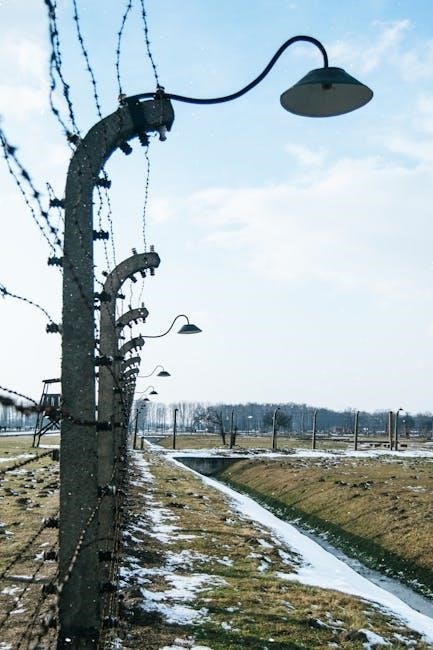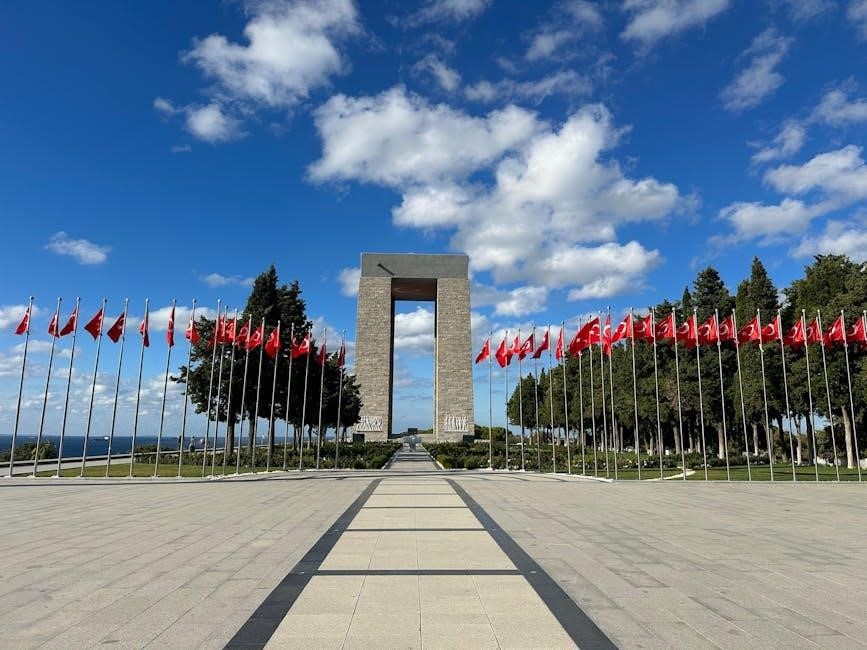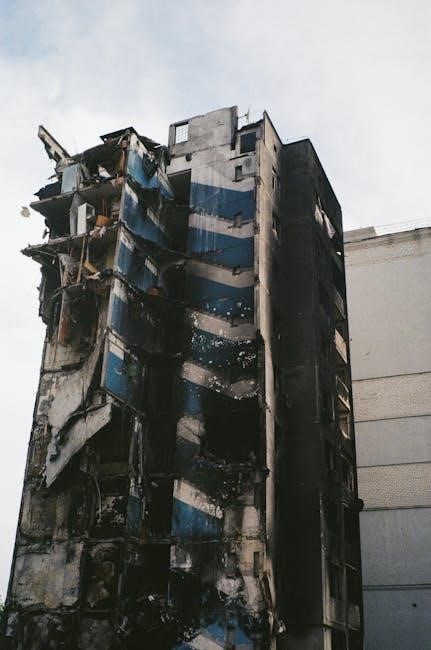Overview of the Great War
The Great War‚ also known as World War 1‚ was a global conflict that lasted from 1914 to 1918‚ involving many nations‚ including European countries‚ Russia‚ the United States‚ and the Middle East.
The war was fought between the Allied Powers and the Central Powers‚ and it resulted in the loss of millions of lives and widespread destruction.
The war had a profound impact on the world‚ leading to the fall of several empires and the rise of new nations.
The Great War was characterized by the use of new military technologies‚ such as tanks‚ airplanes‚ and machine guns‚ which made it a more devastating and deadly conflict than any previous war.
The war also had a significant impact on society‚ leading to changes in the way people lived‚ worked‚ and interacted with each other.
The Great War is considered one of the most important events of the 20th century‚ and its legacy continues to shape the world today.
The war led to the signing of the Treaty of Versailles‚ which imposed harsh penalties on Germany and contributed to the rise of Nazi Germany.
The Great War is a complex and multifaceted topic‚ and understanding its causes‚ course‚ and consequences is essential for understanding the modern world.
The study of the Great War provides valuable insights into the nature of war‚ the impact of technology on society‚ and the complexities of international relations.
The Great War was a turning point in world history‚ and its effects are still felt today.
The war marked the end of the old imperial order and the beginning of a new era of international relations.
The Great War is a reminder of the devastating consequences of war and the importance of working towards peace and understanding.
The study of the Great War is an important part of any history curriculum‚ and it provides a unique perspective on the complexities of the modern world.
The Great War was a global conflict that involved many different countries and cultures‚ and its study provides a valuable insight into the diversity of human experience.
The war had a profound impact on the world‚ and its legacy continues to shape the world today.
The Great War is an important topic for students of history‚ and its study provides a unique perspective on the complexities of the modern world.
The war marked the end of the old imperial order and the beginning of a new era of international relations‚ and its study provides valuable insights into the nature of war and the impact of technology on society.
The Great War is a complex and multifaceted topic‚ and its study is essential for understanding the modern world.
The war had a significant impact on society‚ leading to changes in the way people lived‚ worked‚ and interacted with each other‚ and its study provides a valuable insight into the diversity of human experience.
The Great War is a reminder of the devastating consequences of war and the importance of working towards peace and understanding‚ and its study is an important part of any history curriculum.
The war was a turning point in world history‚ and its effects are still felt today‚ and the study of the Great War provides a unique perspective on the complexities of the modern world.
The Great War was a global conflict that involved many different countries and cultures‚ and its study provides valuable insights into the nature of war‚ the impact of technology on society‚ and the complexities of international relations.
The war marked the end of the old imperial order and the beginning of a new era of international relations‚ and its study provides a valuable insight into the diversity of human experience;
The Great War is an important topic for students of history‚ and its study provides a unique perspective on the complexities of the modern world‚ and its legacy continues to shape the world today.
The war had a profound impact on the world‚ leading to the fall of several empires and the rise of new nations‚ and its study provides valuable insights into the nature of war and the impact of technology on society.
The Great War is a complex and multifaceted topic‚ and its study is essential for understanding the modern world‚ and its effects are still felt today.
The war was a turning point in world history‚ and its legacy continues to shape the world today‚ and the study of the Great War provides a unique perspective on the complexities of the modern world.
The Great War is a reminder of the devastating consequences of war and the importance of working towards peace and understanding‚ and its study is an important part of any history curriculum‚ and it provides a valuable insight into the diversity of human experience.
The war marked the end of the old imperial order and the beginning of a new era of international relations‚ and its study provides valuable insights into the nature of war‚ the impact of technology on society‚ and the complexities of international relations‚ and its legacy continues to shape the world today.
The Great War was a global conflict that involved many different countries and cultures‚ and its study provides a unique perspective on the complexities of the modern world‚ and its effects are still felt today.
The war had a significant impact on society‚ leading to changes in the way people lived‚ worked‚ and interacted with each other‚ and its study provides valuable insights into the nature of war and the impact of technology on society‚ and its legacy continues to shape the world today.
The Great War is an important topic for students of history‚ and its study provides a unique perspective on the complexities of the modern world‚ and its study is essential for understanding the modern world.
The war was a turning point in world history‚ and its legacy continues to shape the world today‚ and the study of the Great War provides a valuable insight into the diversity of human experience‚ and its effects are still felt today.
The Great War is a complex and multifaceted topic‚ and its study is essential for understanding the modern world‚ and its study provides valuable insights into the nature of war‚ the impact of technology on society‚ and the complexities of international relations.
The war marked the end of the old imperial order and the beginning of a new era of international relations‚ and its study provides a unique perspective on the complexities of the modern world‚ and its legacy continues to shape the world today.
The Great War was a global conflict that involved many different countries and cultures‚ and its study provides valuable insights into the nature of war‚ the impact of technology on society‚ and the complexities of international relations‚ and its effects are still felt today.
The war had a profound impact on the world‚ leading to the fall of several empires and the rise of new nations‚ and its study provides a valuable insight into the diversity of human experience‚ and its legacy continues to shape the world today.
The Great War is an important topic for students of history‚ and its study provides a unique perspective on the complexities of the modern world‚ and its study is essential for understanding the modern world‚ and its effects are still felt today.
The war was a turning point in world history‚ and its legacy continues to shape the world today‚ and the study of the Great War provides a valuable insight into the diversity of human experience‚ and its study provides valuable insights into the nature of war‚ the impact of technology on society‚ and the complexities of international relations.
The Great War is a reminder of the devastating consequences of war and the importance of working towards peace and understanding‚ and its study is an important part of any history curriculum‚ and it provides a unique perspective on the complexities of the modern world‚ and its legacy continues to shape the world today.
The war marked the end of the old imperial order and the beginning of a new era of international relations‚ and its study provides valuable insights into the nature of war‚ the impact of technology on society‚ and the complexities of international relations‚ and its effects are still felt today.
The Great War was a global conflict that involved many different countries and cultures‚ and its study provides a valuable insight into the diversity of human experience‚ and its study provides valuable insights into the nature of war‚ the impact of technology on society‚ and the complexities of international relations.
The war had a significant impact on society‚ leading to changes in the way people lived‚ worked‚ and interacted with each other‚ and its study provides a unique perspective on the complexities of the modern world‚ and its legacy continues to shape the world today.
The Great War is an important topic for students of history‚ and its study provides a unique perspective on the complexities of the modern world‚ and its study is essential for understanding the modern world‚ and its effects are still felt today.
The war was a turning point in world history‚ and its legacy continues to shape the world today‚ and the study of the Great War provides a valuable insight into the diversity of human experience‚ and its study provides valuable insights into the nature of war‚ the impact of technology on society‚ and the complexities of international relations‚ and its effects are still felt today.
The Great War is a complex and multifaceted topic‚ and its study is essential for understanding the modern world‚ and its study provides valuable insights into the nature of war‚ the impact of technology on society‚ and the complexities of international relations‚ and its legacy continues to shape the world today.
The war marked the end of the old imperial order and the beginning of a new era of international relations‚ and its study provides a unique perspective on the complexities of the modern world‚ and its effects are still felt today.
The Great War was a global conflict that involved many different countries and cultures‚ and its study provides valuable insights into the nature of war‚ the impact of technology on society‚ and the complexities of international relations‚ and its legacy continues to shape the world today.
The war had a profound impact on the world‚ leading to the fall of several empires and the rise of new nations‚ and its study provides a valuable insight into the diversity of human experience‚ and its effects are still felt today.
The Great War is an important topic for students of history‚ and its study provides

Causes of World War 1
Imperialism and nationalism sparked tensions leading to the Great War‚ with complex alliances and rivalries between European nations ultimately contributing to the outbreak of conflict and war online always.
Imperialism and Nationalism
Imperialism and nationalism played significant roles in the outbreak of World War 1‚ as European nations competed for colonies and resources‚ leading to tensions and rivalries. The complex system of alliances and the rise of nationalist movements further exacerbated these tensions‚ ultimately contributing to the war.
The imperialist policies of European powers‚ such as Britain‚ France‚ and Germany‚ led to the scramble for Africa and the division of the continent into colonies‚ which created an atmosphere of competition and hostility.
Nationalist movements‚ on the other hand‚ emphasized the importance of national identity and unity‚ often at the expense of other nations‚ leading to an increase in militarism and aggression.
The combination of imperialism and nationalism created a volatile environment in which the assassination of Archduke Franz Ferdinand could spark a global conflict‚ drawing in multiple nations and empires.
Understanding the role of imperialism and nationalism in the outbreak of World War 1 is crucial for grasping the complexities of the conflict and its far-reaching consequences.

Major Events of World War 1
Major events include battles and treaties that shaped the war’s outcome and impacted European society and history forever online now with detailed study guides and resources available always everywhere.
Treaty of Versailles and Its Consequences
The Treaty of Versailles was a peace settlement imposed on Germany by the Allied Powers‚ led by the United States‚ France‚ and Britain‚ after the end of World War 1. The treaty was signed on June 28‚ 1919‚ and it officially ended the state of war between Germany and the Allied Powers. The treaty imposed harsh penalties on Germany‚ including significant territorial losses‚ massive reparations‚ and severe limitations on its military. The consequences of the treaty were far-reaching and had a profound impact on European society and politics. The treaty’s emphasis on national self-determination and the redrawing of national borders led to the creation of new states and the redrawing of the map of Europe. The treaty also imposed significant economic burdens on Germany‚ which contributed to widespread poverty‚ unemployment‚ and social unrest. The treaty’s failure to provide a lasting peace and its contribution to the rise of Nazi Germany are still debated by historians today. The study of the Treaty of Versailles and its consequences is essential to understanding the complexities of World War 1 and its ongoing impact on modern history.

Impact of World War 1 on European Society
World War 1 had a profound impact on European society‚ causing widespread destruction and social change always affecting economy and politics greatly online now.
Rise of New World Orders and Totalitarian Regimes
The aftermath of World War 1 saw the rise of new world orders and totalitarian regimes‚ which had a profound impact on global politics and society.
The war led to the downfall of several empires‚ including the German‚ Austro-Hungarian‚ and Russian empires‚ creating a power vacuum that was filled by new ideologies and leaders.
The rise of fascist and communist regimes in Europe and Asia‚ such as Nazi Germany and Soviet Russia‚ marked a significant shift in the global balance of power.
These regimes were characterized by their authoritarian nature‚ suppression of individual freedoms‚ and aggressive expansionist policies.
The rise of totalitarian regimes also led to the formation of new alliances and the escalation of tensions between nations‚ ultimately contributing to the outbreak of World War 2.
The legacy of World War 1 can be seen in the modern world‚ with many of the global conflicts and political tensions of today having roots in the aftermath of the war.
The study of the rise of new world orders and totalitarian regimes is essential to understanding the complexities of modern history and the ongoing struggles for power and ideology that shape our world.
The impact of these regimes can still be felt today‚ making it a crucial topic for students and historians to explore and learn from.

Key Players and Their Roles in World War 1
Leaders like Woodrow Wilson and David Lloyd George played significant roles in shaping the war’s outcome and negotiations effectively online always with great historical impact and importance still today somehow.

Be First to Comment